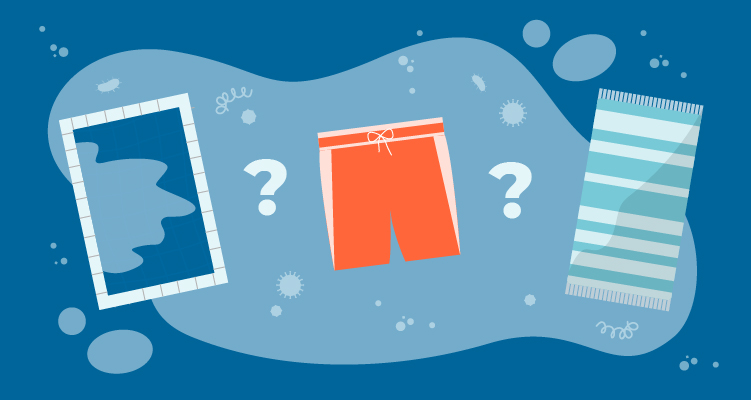The sun is shining and the smell of barbecue fills the air – a perfect day for a swim – and the last thing you want to worry about is whether you can get an STD from a swimming pool. There are a multitude of STD myths circulating on the Internet and in everyday conversations, to the point where it can sometimes be difficult to separate fact from fiction. But we’re here to set things right!
So can you get an STD from a swimming pool? As always, it is recommended that if you experience symptoms, you visit your healthcare provider or a local STD testing center to get a solid diagnosis. But by providing additional context to this question, we hope to ease your concerns.
Is it possible to get an STD from a public pool?

The short answer is no. It is unlikely that anyone will get an STD such as gonorrhea, chlamydia, or hepatitis B from a pool or hot tub. But there is something more to it. Although many infections can be transmitted in a pool or hot tub environment, such as a cryptosporidium infection (usually transmitted through feces), they are usually spread in pools that do not pass public pool, hot tub and spa inspection.1,2 Bacteria and viruses have a much harder time growing in pools or hot tubs that are properly treated with proper chlorine levels and brought to safe PH levels.
As long as individuals’ bodily fluids remain in their bodies and pool water is properly treated according to guidelines such as The model code for aquatic healthtransmission is unlikely.3 Although you are unlikely to contract an STD from just swimming in a pool or hot tub, engaging in sexual activity in the pool does come with risks.
Sexual health tips for pools and hot tubs
With this knowledge in mind, there are several steps you can take to ensure your risk of contracting a waterborne infection (STD or not) is minimized. In addition to the recommended routine STD testing, showering after swimming, drying your ears, visiting recreational pools with regular cleaning inspections, and keeping a personal towel are all good habits to form.
Below are some frequently asked questions and sexual health tips regarding public pools and hot tubs.
Can you get an STD if you share a pool?
Answer: It has not been shown that informal swimming in a public swimming pool poses a risk of STD transmission.
Can STDs survive in water?
Answer: Yes, technically some STDs can survive in water. However, due to several factors such as water treatment and dilution, water is very unlikely to be a strict method of transmission.
What infections can swimming pools carry?
Answer: The Centers for Disease Control and Prevention reports that the most common recreational water infections Involving,4
- Cryptosporidium
- Legionella
- Pseudomonas
- Norovirus
- Shigella
What is the risk of sexual activity in a pool or hot tub?
Answer: Sexual contact in general always involves a certain risk, including in swimming pools or hot tubs. This is because contact with the permeable membranes of the vagina or penis opens up the possibility that such contact could transmit the infection from one person to another.
Can STDs pass through swimsuits?
Answer: Body fluids are one of the main carriers of STDs, and realistically body fluids can pass through bathing suits. You’re unlikely to contract an STD from water flowing through a swimsuit while swimming casually, but infected body fluids can potentially penetrate through swimsuits if sexual contact occurs.
Can you get an STD from a beach towel?
Answer: Although not as likely as direct sexual contact, trichomoniasis is known to occur through sharing damp towels or bathing suitsas explained by the Naval Medical Center Portsmouth.5
Conclusion
In conclusion, as long as you visit pools that are cleaned regularly, avoid sexual contact in the water, and keep your own pool towel, STDs don’t have to be a problem. Concern about your sexual health is always encouraged, and it can be tricky when fact and fiction merge.
Some other common questions that arise from misunderstandings about sexual health include:
We hope these resources can help you answer your questions about STDs, sexual health, and preventive measures. Can you get an STD from swimming pools? No, not from recreational swimming, but there are plenty of STD testing centers near you that offer quick, easy and stress-free testing options to ease your concerns if you’re unsure.
Sources
- “Model Aquatic Health Code: General Information.” Center for Disease Control and Prevention. Centers for Disease Control and Prevention, July 18, 2018. www.cdc.gov/mahc/general-information.html
- “Pool and hot tub/spa inspections.” Center for Disease Control and Prevention. Centers for Disease Control and Prevention, May 4, 2016. www.cdc.gov/healthywater/swimming/public-health-professionals/pool-hot-tub-inspections.html
- “The Model Aquatic Health Code (MAHC).” Center for Disease Control and Prevention. Centers for Disease Control and Prevention, January 19, 2021. www.cdc.gov/mahc/index.html
- “Recreational Water Diseases.” Center for Disease Control and Prevention. Centers for Disease Control and Prevention, June 4, 2020. www.cdc.gov/healthywater/swimming/swimmers/rwi.html
- “Trichomoniasis Fact Sheet.” Naval Medical Center Portsmouth, accessed March 28, 2022. portsmouth.tricare.mil/Portals/130/Trichomoniasis.pdf

